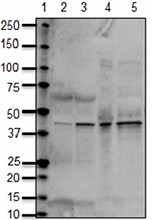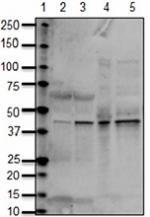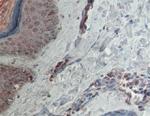- Clone
- O92B5 (See other available formats)
- Regulatory Status
- RUO
- Other Names
- TGF-Beta-1, TGFB, Latency-Associated Peptide, DPD1, LAP, CED
- Isotype
- Mouse IgG2a, κ
- Ave. Rating
- Submit a Review
- Product Citations
- publications

-

Western blot of anti-TGF-β1 antibody (clone O92B5). Lane 1: Molecular weight marker; Lane 2: 30 µg of human spleen lysate; Lane 3: 30 µg of human skin lysate; Lane 4: 20 µg of A549 cell lysate; Lane 5: 20 µg of U251 cell lysate. The blot was incubated with the primary antibody at 10 µg/ml overnight at 4°C, followed by incubation with HRP labeled goat anti-mouse secondary antibody. -

IHC staining of anti-TGF-β1 antibody (clone O92B5) on formalin-fixed paraffin-embedded human skin tissue. Following antigen retrieval using sodium citrate, the tissue was incubated with the primary antibody for two hours at room temperature at 5 µg/ml. BioLegend's Ultra-Streptavidin (USA) HRP Detection Kit was used for detection followed by counterstaining with hematoxylin.
| Cat # | Size | Price | Quantity Check Availability | Save | ||
|---|---|---|---|---|---|---|
| 846802 | 100 µg | $347 | ||||
TGF-β1 is a member of the transforming growth factor beta superfamily of cytokines. TGF-β1 is produced as a large protein precursor, containing 390 amino acids, that is proteolytically processed to produce a mature peptide of 112 amino acids. It is a secreted protein that has different effect on different cell types or developmental stages some of which include immune cell regulation.
Product DetailsProduct Details
- Verified Reactivity
- Human
- Antibody Type
- Monoclonal
- Host Species
- Mouse
- Immunogen
- Full length human TGF-β1 recombinant protein.
- Formulation
- Phosphate-buffered solution, pH 7.2, containing 0.09% sodium azide.
- Preparation
- The antibody was purified by affinity chromatography.
- Concentration
- 0.5 mg/ml
- Storage & Handling
- The antibody solution should be stored undiluted between 2°C and 8°C.
- Application
-
WB - Quality tested
IHC-P - Verified - Recommended Usage
-
Each lot of this antibody is quality control tested by Western blotting. For Western blotting, the suggested use of this reagent is 2.0 - 5.0 µg/ml. For immunohistochemical staining on formalin-fixed paraffin-embedded tissue sections, the suggested use of this reagent is 5.0 - 10 µg/ml. It is recommended that the reagent be titrated for optimal performance for each application.
- Product Citations
-
- RRID
-
AB_2629662 (BioLegend Cat. No. 846802)
Antigen Details
- Structure
- TGF-β1 is a 390 amino acid protein with a molecular mass of 44 kD.
- Distribution
-
Tissue distribution:bone, blood, and epithelial cells.
Cellular distribution: extracellular, golgi apparatus, nucleus, plasma membrane, and cytoskeleton. - Function
- TGF-β1 is a protein involved in the regulation of many cellular processes such as cell growth and survival, cell and tissue differentiation, development, inflammation, immunity, hematopoiesis, tissue remodeling, wound healing, and stimulates ECM deposition and angiogenesis.
- Interaction
- Multiple cells express the TGF-β1 receptors.
- Ligand/Receptor
- TGF-β1 receptors.
- Cell Type
- Epithelial cells
- Biology Area
- Apoptosis/Tumor Suppressors/Cell Death, Cell Biology, Cell Cycle/DNA Replication, Immunology, Neuroinflammation, Neuroscience
- Molecular Family
- Cytokines/Chemokines, Growth Factors
- Antigen References
-
1. Diniz LP, et al. 2014. Neurochem. 78:18. PubMed
2. Martinez-Canabal A. 2015. Int. J. Neurosci. 125:1. PubMed
3. Gomes FC, et al. 2005. Int. J. Dev. Neurosci. 23:413. PubMed
4. Krieglstein K, et al. 2002. J. Physiol. Paris 1-2:25. PubMed - Gene ID
- 7040 View all products for this Gene ID
- UniProt
- View information about TGF-beta1 on UniProt.org
Related FAQs
Other Formats
View All TGF-β1 Reagents Request Custom Conjugation| Description | Clone | Applications |
|---|---|---|
| Purified anti-TGF-β1 | O92B5 | WB,IHC-P |
Compare Data Across All Formats
This data display is provided for general comparisons between formats.
Your actual data may vary due to variations in samples, target cells, instruments and their settings, staining conditions, and other factors.
If you need assistance with selecting the best format contact our expert technical support team.
 Login/Register
Login/Register 









Follow Us